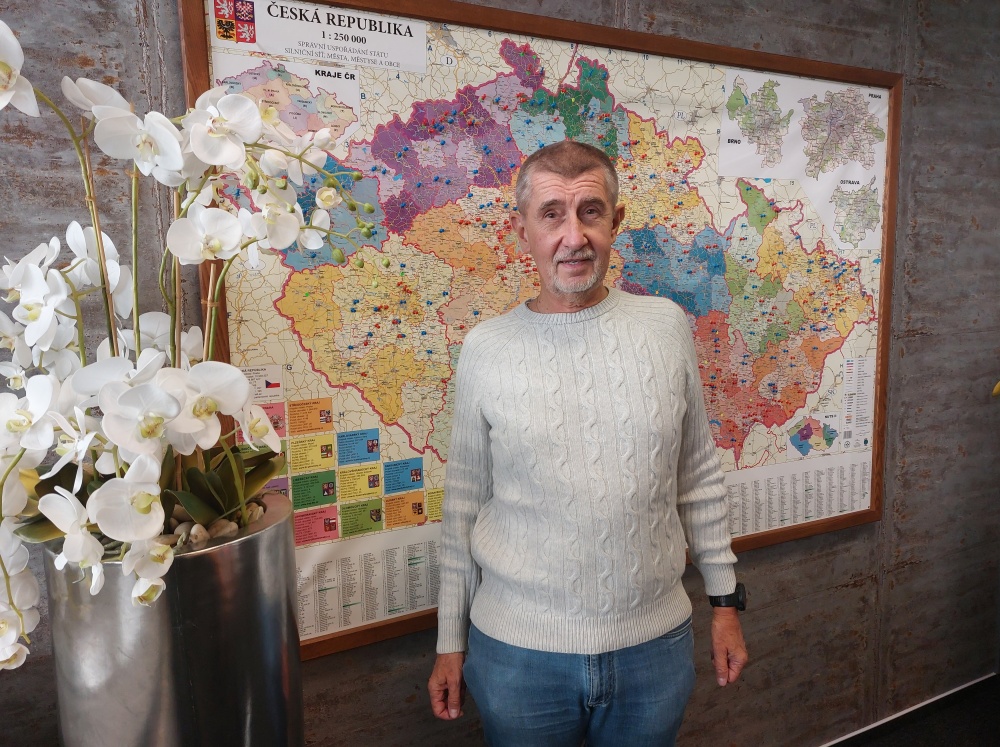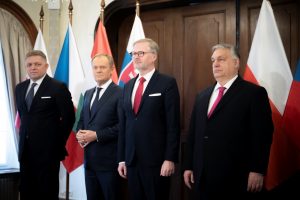
The former Czech Prime Minister believes the importance of the Visegrad 4 is on the rise again. Continue reading

We have met Czech MEP Jan Zahradil in Budapest prior to his lecture for the Danube Institute entitled “Realignment of the Right, Post EU Election”. Mr. Zahradil is a Member of the European Parliament for the Czech governing party ODS (Civic Democrats), and was instrumental to the establishment of the European Conservatives and Reformists (ECR) bloc.
——————————————
Your speech delivered at the Danube Institute is calling for unity among mainstream conservative forces in European in view of rising „insurgent right-wing parties”. The Hungarian conservatives’ message is in fact the opposite – such a unity is essential in view of the rising hard left in Europe. Why do you feel that the main threat comes from the right?
Right-wing forces always have to take the left as a challenge. Particularly since 2019, when a radical green agenda had penetrated almost all other European agendas, it has been a great challenge for conservative forces, but also for business friendly, entrepreneurial groups. This is something that we can identify as a common ground for unity. It is probably going to be the green parties who will be the biggest losers of the June European elections. At the same time, the two right-wing families, the ID (Identity and Democracy) and the ECR are expected to make gains. This is a new phenomenon on the European political scene.
Let me be clear then: you are calling for a unity among conservative forces not because of the challenge from the “insurgent hard right” parties, but because of the challenge from the left.
Speaking about radical right is an exaggeration. What we have seen is that the European left and the liberal center is demonizing part of the European right, particularly by designating national conservatives as “extremists”, as forces that go beyond the democratic discourse. This is not fair.
I remember when the Italian Brotherhood joined the ECR group. All European media were referring to them as “post-fascist”. Now Giorgia Meloni is regarded as part of the European mainstream. So you can see this is simply a purposeful labeling created to generate political infighting and has nothing to do with reality.
Such a labeling is still ongoing against the Hungarian government party FIDESZ. Would you consider Viktor Orbán’s FIDESZ party the “insurgent right”, or as a mainstream movement?
FIDESZ is a good example of a national conservative party that embraces some issues that traditional conservatives handled some 20-25 years ago. But the global atmosphere has changed, and so did right-wing parties. National conservatives are more in favor of national sovereignty, suspicious of transnational institutions, because they think those are run by left-wing liberals and are therefore biased. They are not so pro-free market as they were under Ronald Reagan or Margaret Thatcher. To the contrary, they can sometimes even call for protectionist measures to safeguard their own domestic markets.
Despite the need for unity among conservatives, the government of Petr Fiala, who is from your party, the ODS, has turned its back on its Visegrad 4 allies with national conservative governments. Namely, Slovakia and Hungary, and that mostly because of their stance on migration and Ukraine. Do you think this is the right approach to handling the differences in Central Europe?
It is clear that Ukraine is a dividing line. Within the Visegrad 4 Poland and Czechia are very pro-Ukrainian, they are in support of arming Ukraine, etc. Slovakia and Hungary prefer a different approach. I believe that in the long term this approach will prevail, namely that this war will one day come to an end. I do not want to predict how and when, but we will still be here. We will have to cooperate after the war somehow, because there are common denominators that unite us in the Central European space. So even if we have different approaches to Ukraine, we should think within long term horizons and understand that even after the war we are predestined to cooperate.

Leaders of the Visegrad 4 countries in Prague, February 27. (L-R) Robert Fico, Donald Tusk, Petr Fiala, Viktor Orbán. Photo: MTI/Miniszterelnöki Sajtóiroda/Benko Vivien Cher
Do you think that Prime Minister Petr Fiala understands this point? Namely that we have to gear ourselves for a long-term cooperation rather than being divided over one particular issue?
I do not speak on his behalf. But very soon, probably after the US presidential elections in November we will have to reassess where the entire situation is heading. We will then know whether the Biden administration continues in its known course, or whether it will be replaced by a different administration taking a different one. This will be a particularly important element in view of how Central Europeans think about their future strategy vis-à-vis Ukraine.
We have our parliamentary elections in the Czech Republic next year, so we should think well beyond the present election periods.
It is very hard to distinguish now the main government party, the ODS, from the rest of the left-wing parties in the Czech Republic. They were not able, for instance, to formulate their alternative to radical green policies, they maintain an ambiguous stance on migration, and have turned their back on allies with national conservative governments, Slovakia and Hungary. What make the Fiala-lead ODS different from any of the standard left-wing parties in Europe, apart from it being in the ECR?
The substance is still there, but we have to take into account that they are part of a coalition government made out of five political parties, some centrist liberals, some left-wing liberals. So despite the fact that ODS has the prime minister, it does not represent a majority in the government. Some people, including me, are not happy about this development, and are asking themselves whether we did not pay too much of a price for the fact that we are in the government. We have had to make a lot of compromises and now the question is whether we have gone too far.
Of course, the elections will show what our voters think about this. But I have to admit that as an ODS party member, one of the founding members in 1991, I am not always happy with the compromises that we have to do in this government.
For an average Hungarian conservative it can be frustrating to watch the Czech Republic’s position on migration. The Czechs have decided to abstain during the vote on migrant quotas. Why is that – you do not have a position on this, or you cannot make your mind up about this issue?
This is part of the price we had to pay for the EU presidency, where as a presiding country we cannot pursue our own interests. We are there to facilitate a compromise among 27 members. That compromise was not always what we would have chosen if we were voting for on ourselves.
But you are still responsible for the best interests of Czech citizens, your own national interest, regardless of EU presidency.
Sure! But this is the price we had to pay for our presidency in the EU council. The question is how voters will assess that.

Jan Zahradil. Photo: Hungary Today
You are in the European Parliament’s ECR bloc and can see its inner dynamics. After the June elections one of the options is the FIDESZ will ask for a ECR membership. How would your party, ODS, position itself in such a situation? There are other parties to the right of ODS, such as the True Finns, who have threatened to walk out of the ECR should FIDESZ join because of the Hungarians’ stance on Ukraine.
There would be a vote and a democratic decision, such as in the case of Alternative für Deutschland (AfD) in 2014. The British Conservatives were against, but the secret ballot had determined that the AfD was granted membership. Eventually the Conservatives have stayed, even though they were not happy with the final result. This will be a similar situation with a secret ballot.
But where does your party stand on this?
What my party will do I cannot consider at this moment. I will advise my FIDESZ friends to negotiate with their counterparts, especially those who might have some concerns, and address those. Of course the most divisive issue is the Ukrainian one. We will also have to take it into account that Hungary will be a presiding country of the European Council in the second half of this year, which will put Hungary in the spotlight. How they will act might play a role in the decision making. All options are open.
Last year I have given a presentation in front of young Czech conservative students in Prague. They told me that they are in a particular situation, because they have no one to vote for. They do not trust Andrej Babis, the SPD is too right-wing, and the rest is all left liberal. At the same time they expressed a wish to have someone with similar policies to Hungarian conservatives. What would you advise them to do in this situation?
This is really interesting because I do not believe that someone new will emerge to answer their expectations before the next elections, and save the national conservative agenda. But this is why I am becoming more critical towards the leadership of my party, and I am not shy to articulate it publicly, that we have not embraced the national conservative agenda, rather have abandoned it. What (former Czech PM) Andrej Babis did, was quite smart. He understood that there is a vacuum and he started to fill this demand. If he continues to play more of this conservative card, then those people will have probably no other option than to vote for him. Even if they know that he is not entirely reliable, or can flip-flop.
But it is no only Babis. His party ANO, is better defined than they used to be, and there are other people there than just him. For instance, Karel Havlícek, then you have Alena Schillerová. They are quite skillful in communicating with people. But there clearly is a tendency in Babis’ party to embrace more of a national conservative agenda. Whether it is genuine or it is only done for electoral purposes is another part of the story.
I put this question to Mr. Babis last year and he replied that his is not a conservative party, it is a “catch-all party”.
Oh yes, he likes to say that. But if you look at them, they are much more conservative than ever before. There is evidence that he is starting to understand that this type of thinking, this type of agenda needs to be embraced. If someone else is abandoning that, he can jump into that empty space.

Jan Zahradil. Photo: Hungary Today
So you are hopeful then that the Czech-Hungarian relationship can be rebuilt in the near future?
I hope that my party, ODS, will still wake up, even in the uneasy situation of a coalition where we are in a de facto minority position. We hope the party will start working on its own agenda, but then we will see what happens during the elections.
Featured Image: Hungary Today